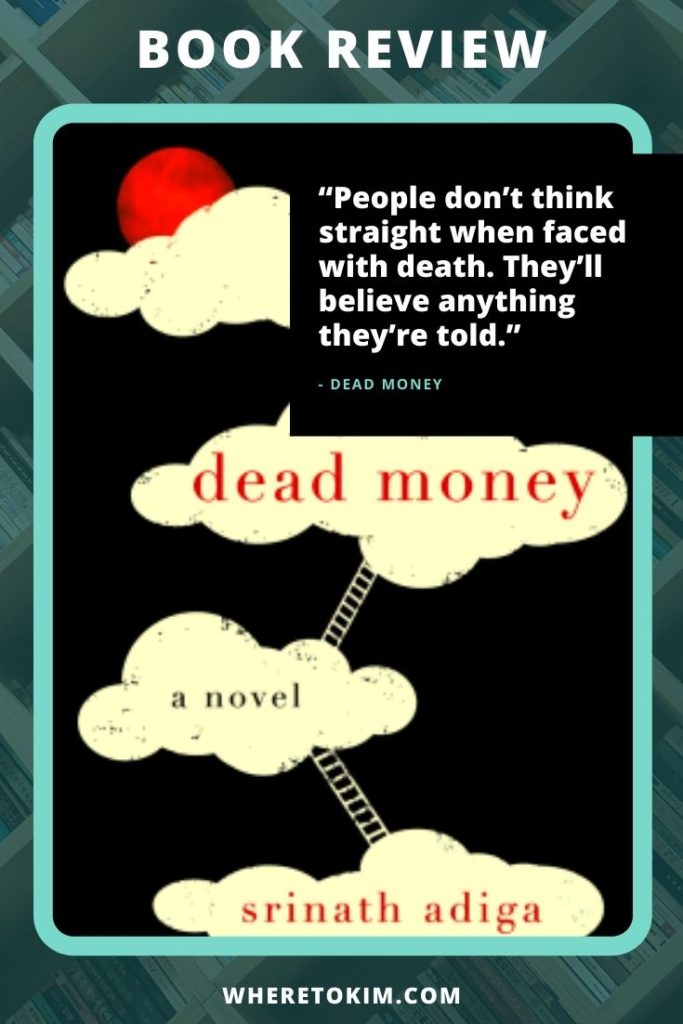Dead Money by Srinath Adiga is about the power of hope. How far do you think that people are willing to go for what they believe in?
Dead Money synopsis
They said you can’t take your money with you when you die. What if they were wrong?
A stock market trader in Hong Kong desperate to pay off a fifty-three-million-dollar gangster debt. A mysterious suicide bomber in Mumbai under the spell of a dangerous myth. A banker in Amsterdam waging a lone battle to avert a global catastrophe.
Three men whose disparate journeys are connected by a dizzying chain of causes and effects from Afterlife Dollars. A product based on Chinese mythology that promises happiness in the next world, yet has a devastating effect on this one. As the characters grapple with their individual moral dilemmas, their choices will affect the rest of humanity.
Profound, intense and cleverly plotted with unexpected twists and turns, Dead Money is a multi-faceted satire about capitalism, religion and how the very things that make us human can ultimately lead to our demise.
Book review
First story
“People don’t think straight when faced with death. They’ll believe anything they’re told.”
One of the thoughts most frequently expressed in Dead Money is that everything is just an illusion spun up by people so they don’t have to think about the depressing fact that nothing matters, death will follow anyhow.
Dead Money builds on the Chinese beliefs about the afterlife. The main character, Raymond, takes the concept of Hell Money and turns it into the thriving economic asset Afterlife Dollars. Everything is make-believe, or is it? Good branding can convince you something is cool, but what makes one thing (for example a t-shirt) better than another? What makes Afterlife Dollars different from other new currencies like Bitcoin?
Even though I found it interesting to read about the creation of a new disrupting business, it didn’t inspire me as much as these stories usually do. The narrator Raymond is a master at bending reality though, I have to give him that. He seizes upon opportunities unique to the situation the world is currently in like the coronavirus and all of its consequences. The most confronting part of it all is that schemes like this one are happening all over the world.
At first, I found it hard to believe that Raymond would be able to spin up a good enough story that would work in Europe. But in the end, what’s the difference between one spiritual thing people believe in and others? What’s so different between what he creates versus the religions and spiritual beliefs that were created in the past? The story Srinath Adiga spun is really engaging my mind with the ethics behind this. Dead Money is not about condemning Raymond, but rather about everything that is going on in the world right now.
Second and third story
“Don’t get your hopes up, he counseled himself. But how could he not, considering the nature of hope? Insidious, spreading surreptitiously, just like the disease.”
The narrator of the second story is Sanjit, a guy that can be described in many ways but can only describe himself as the sick person he became. To him, disease brings freedom as it takes away the pressures of having to achieve. If you’re gonna die anyway, what does it matter that something is not true? Peace of mind is priceless. I often buy lottery tickets even though the chance of me winning is on par with Afterlife Dollars existing.
Sanjit’s story builds on what happens in Hong Kong in the first part and Theo’s story (the third part) is triggered by the events in both the first and second part. Even though Dead Money does not read like a continuous story because of the narrator switches and time jumps, the three parts are connected in their exploration of moral boundaries: where do you draw the line when it comes to gathering money? Especially combined with the most basic of fears: the fear of dying, the fear of being poor, and the fear of missing out.
My opinion
The three stories are very realistic and well-written accounts of how three people with different backgrounds deal with their struggles in life. Be it financial, healthwise, or purposewise. They’re stories of transformation. The content is interesting and the writing skills of Srinath Adiga are good. Despite all that, it took me a long time to finish the book.
This is partly because there was no surprising turn of events (to me). Dead Money reads like a case study. So while I greatly appreciate the character building, the setting, and the Afterlife Dollars concept with all of its consequences, I didn’t enjoy the book as much as I expected. I’d almost say it reads like a non-fiction book illustrating the rise and downfall of an economic asset and the industry surrounding it. The consequences of the Afterlife Dollars economy as a whole are more interesting than the stories of the narrators.
So yes, it is a truly interesting book to read, but not the most exciting. I do feel limited by the star rating system. I would give 3 stars for the enjoyable read and 5 stars for engaging my mind (as you can see from the length of this review). Still, I rounded my rating down to three stars because I find the first one more important for fiction books.
The main reason for my lesser reading experience is that the middle part is less interesting and hardly moves the plot forward. On the other hand, the first part reads like a thriller and I was curious where the third part would take me (a somewhat hasty dystopian ending apparently).
Regardless of the above: Dead Money leaves me intrigued and makes me think about my choices in life and how my choices influence the world. While I would never want to do something like Raymond, I do feel inspired to identify emerging industries and take part in their growth.
Questions for reflection
What also stayed with me is the question of whether I would realize it when I am being fooled? As for you, do you know what’s fooling you? What did you buy into recently? Do you believe what you see on the news, what you read in books, or on my blog?
I want to end my review with the following topic for discussion: Are Afterlife Dollars per definition bad if they contribute to the spiritual and mental wellbeing of people?
Let me know your thoughts after reading the book.
Interested?
Pre-order your copy of Dead Money from Amazon (available 26 January 2021).
Many thanks to Central Avenue Publishing and NetGalley for a digital ARC of this novel in exchange for an honest review.







